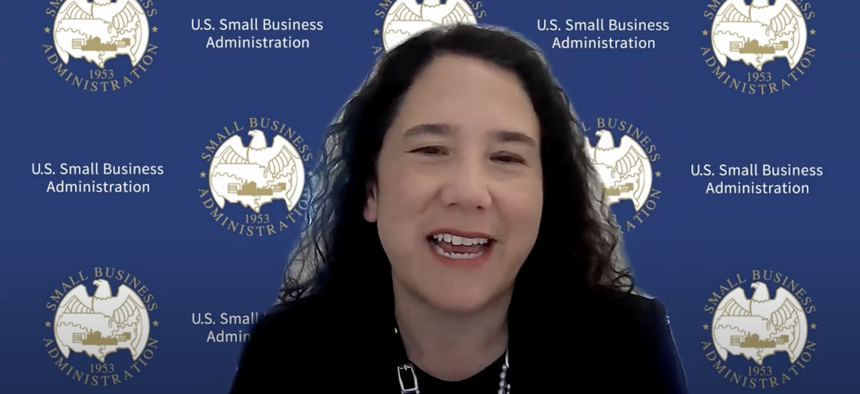
“The Biden administration continues to raise the bar,” SBA Administrator Isabella Guzman said in a statement. Screengrab by GovExec/SBA
Small businesses’ share of federal contracting dollars reaches ‘all time high,’ SBA says
Federal agencies paid small businesses $162.9 billion for contracting work—the most ever recorded—in fiscal 2022, although the proportion of federal contract dollars going to small businesses declined to 26.5%.
The Small Business Administration on Tuesday announced that in fiscal 2022, the federal government directed more money than ever—$162.9 billion—to small business contractors, although their share of overall procurement spending declined.
Each year, SBA officials issue a scorecard measuring the federal government’s performance in awarding contracts to small businesses, as well as businesses owned by women, minorities and veterans. They also work with agencies to set goals for the proportion of contract dollars that go to small businesses and historically disadvantaged businesses.
In fiscal 2022, SBA said the federal government’s contractor spending amounted to an $8.7 billion increase over the previous year. But while federal agencies easily surpassed their goal of small business contracts making up 23% of overall procurement spending at 26.5%, that figure falls short of the 27.2% of contractor spending that went to small businesses in fiscal 2021.
“Through President Biden’s Investing in America agenda, we have championed initiatives to fuel our nation’s historic economic growth while reducing barriers and ensuring fair competition in federal contracting,” said SBA Administrator Isabella Guzman in a statement. “The Biden administration continues to raise the bar, reaching a record high level of contract spending with small businesses, supporting over 1 million good-paying jobs in manufacturing, construction, research and development, and other vital industries.”
For the second straight year, agency procurement from small disadvantaged businesses, which refer to companies owned by ethnic minorities and other "economically disadvantaged” firms, exceeded SBA’s goal of 11% at 11.4%. Spending with businesses owned by disabled veterans increased by $3 billion in fiscal 2021 to a total of $28.1 billion the following year, increasing their share of contracting dollars by 0.2% to 4.6% in fiscal 2022.
And women-owned small businesses’ piece of procurement spending stayed steady in fiscal 2022 at 4.6%, although that equates to a $1.9 billion increase over the prior year. Agencies ultimately fell short of their 5% goal in this category, however.
Businesses in historically underutilized business zones, or HUBZones for short, saw a record high investment of $16.3 billion from federal agencies. But that still fell 0.3 percentage points short of SBA’s goal of 3% for businesses in these locations.
The Biden administration has made a concerted effort to make the contract award process more equitable for small and minority-owned businesses, including issuing guidance from the Office of Management and Budget aimed at encouraging new companies to apply for federal contracts and establishing a dashboard so agencies can keep track of new and recent applicants as well as established vendors. The administration has also directed all agencies to include progress toward their small business contracting goals as a portion of performance appraisals for members of the Senior Executive Service who oversee the acquisition workforce.
“Today’s report from the Small Business Administration shows that we’ve also made progress leveling the playing field in federal contracts, with a record $163 billion going to small businesses,” President Biden said in a statement. “Just in the last fiscal year, our policies have supported 1 million jobs in small businesses. This report also shows progress in increasing the share of federal contracts going to small disadvantaged businesses. Vice President Harris and I are committed to ensuring that federal investments build wealth and opportunity for underserved entrepreneurs and small business owners in every community across the country.”







